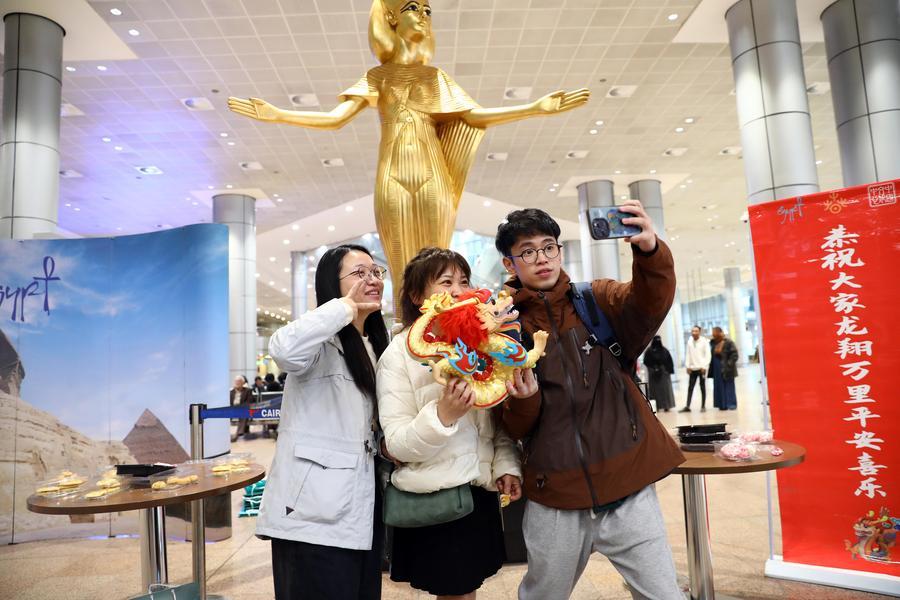Why Middle East becomes popular holiday choices for Chinese tourists?
 0 Comment(s)
0 Comment(s) Print
Print E-mail Xinhua, February 21, 2024
E-mail Xinhua, February 21, 2024
Data from multiple travel platforms indicates that during this year's Spring Festival holiday, Chinese tourists' outbound travel has shown a significant acceleration in recovery, with booking volumes reaching a near four-year peak. Among the popular destinations, Middle Eastern countries have emerged as one of the new favorites for Chinese travelers.
CAIRO, Feb. 20 (Xinhua) -- Mohamed Hassan has been bustling around different tourist attractions in Egypt these days.
A continuous influx of Chinese tour groups has kept this Egyptian tour guide on his toes, and he has lost count of how many times he's visited the pyramids this month.
"I never formally studied Chinese; I acquired it from interacting with Chinese tourists," said Hassan, who speaks fluent Mandarin with a bit of Beijing accent. "These days, my Chinese is progressing even more."
Chinese tourists pose for a photo at Cairo International Airport in Cairo, Egypt, Feb. 10, 2024. (Xinhua/Ahmed Gomaa)
During the Spring Festival holiday, similar sentiments were echoed by tour guides across various Middle Eastern countries. Whether it's at the pyramids in Egypt, in the ancient city of Jerash in Jordan, or in the streets of Iran, Chinese tourists posing for photos were a common sight.
The allure of exotic tourist attractions, hospitable travel environments, and the deepening ties with China are casting Middle Eastern countries as increasingly favored destinations for Chinese travelers venturing abroad.
INFLUX OF CHINESE TOURISTS
It's half past midnight. A long queue had already formed, snaking its way to the boarding gate for Flight HU0471 (from Shenzhen to Cairo) at Bao'an International Airport in the southern Chinese city of Shenzhen.
A flight attendant at the airport told Xinhua that with the onset of the Spring Festival holiday, flights to Cairo have been operating at near full capacity.
Among those waiting in line is Zhang Fengxia from south China's Guangdong Province, who had signed up with her sister for a 10-day tour to Egypt.
"I've been longing to visit Egypt for quite some time, eager to lay eyes on the Egyptian pyramids I've known in books since childhood and to gain a deeper understanding of Egyptian culture and civilization," she said.
Chinese tourists visit the Giza Pyramids scenic spot in Giza, Egypt, Feb. 8, 2024. (Xinhua/Ahmed Gomaa)
The heightened tensions in Gaza and the Red Sea have precipitated a significant decline in tourist arrivals to Middle Eastern nations. However, the influx of Chinese tourists has made their lackluster off-peak travel markets more vibrant.
Data from multiple travel platforms indicates that during this year's Spring Festival holiday, Chinese tourists' outbound travel has shown a significant acceleration in recovery, with booking volumes reaching a near four-year peak. Among the popular destinations, Middle Eastern countries have emerged as one of the new favorites for Chinese travelers.
"We had some safety concerns before coming, but once we got here, we found that the places we visited were safe and beautiful, especially with local tour guide leading the way," said Deng Peng, who was spending the holiday in Jordan with three of her friends.
According to Qunar, a leading Chinese online travel platform, search volumes for countries in the Middle East such as Türkiye, the United Arab Emirates (UAE) and Egypt have surged since last December.
Throughout the entire holiday season, compared to the same period in 2023, outbound travel orders from China to the UAE, Egypt and Morocco have surged by more than threefold. Travel bookings to the city of Dubai alone have seen a growth of over 10 percent.
"China is the largest tourism market," said Moslem Shojaei, director general for marketing and international tourism development at the Iranian Ministry of Cultural Heritage, Tourism and Handicrafts.
A Chinese tourist poses for photos while visiting the archaeological site of Jerash in Jordan, Feb. 10, 2024. (Photo by Mohammad Abu Ghosh/Xinhua)
From March 21, 2023, to Jan. 20, 2024, the number of Chinese tourists visiting Iran exceeded 54,000, and each Chinese tourist spent nearly 1,000 U.S. dollars on average during their trips to the country, Shojaei told Xinhua, adding that the country is now better prepared for Chinese tourists during the Spring Festival holiday.
"Aside from generating economic revenues, the essence and nature of the tourism industry is that of promoting friendship and knowledge," Shojaei said.
MORE THAN TOURISM
Beneath the surge of Chinese tourists to the Middle East lies the discerning hospitality extended by Middle Eastern nations to Chinese visitors, as well as the increasingly close people-to-people exchanges between China and countries in the region.
In an effort to woo Chinese tourists, countries such as Egypt, Jordan, the UAE and Iran have rolled out visa-on-arrival or visa-free options, further streamlining entry processes. Numerous Middle Eastern countries have taken proactive steps to increase the number of direct flights to China.
Tourism officials from Türkiye, Iran and Saudi Arabia have visited China to directly promote their tourism to the Chinese public, and have specifically tailored travel routes for Chinese tourists.
Two Chinese tourists sit on a bench at the historical Sultanahmet Square in Istanbul, Türkiye, Feb. 9, 2024. (Photo by Safar Rajabov/Xinhua)
In countries like the UAE and Egypt, local governments and tourism agencies have put on special festivities and events to celebrate the Chinese New Year with tourists.
"During my travels, I really sensed the locals being super friendly towards China, and it just made the whole experience so delightful," Ms. Zhou, a Chinese traveler, told Xinhua. She had an eight-day adventure planned in Egypt, with destinations that include Cairo, Giza, Luxor, Alexandria, and the Red Sea.
"The relations between China and Egypt are good, and many tour guides here have studied in China. Their proficiency in Chinese is impressive," Zhou said. "All these factors made the whole travel experience really smooth."
Echoing Zhou's viewpoint, Shojaei also believes that the thriving relationship between China and Middle Eastern countries has been the key driver behind the surge of Chinese tourists flocking to the region.
He recalled that during Iranian President Ebrahim Raisi's visit to China in 2023, both countries agreed on tourism cooperation, which greatly bolstered the growth of cross-border tourism between China and Iran.
A recent report on the development of outbound tourism in China released by the China Tourism Academy indicates that as the Chinese economy and tourism market experience a steady recovery, there is an increasing eagerness among the Chinese to embark on overseas travels.
This photo taken on Feb. 3, 2024 shows red lanterns at Istanbul Airport in Istanbul, Türkiye. (Xinhua/Shadati)
It forecasts that in 2024 the number of Chinese outbound tourists will exceed 130 million, marking a 49 percent surge from the 87 million recorded in 2023.
Industry insiders have observed that propelled by the increasingly robust ties between China and Middle Eastern nations, the influx of Chinese tourists to the region is expected to increase even more.
"I expect ... the number of Chinese tourists visiting Egypt to increase more and more," said Ashraf Elewa, CEO of Interpoint Tours Travel in Egypt, noting that his company is ready to receive an increased number of Chinese tourists throughout this whole year.
In the Egyptian coastal city of Hurghada, Chen Zhiming, from east China's Shandong Province enjoyed a pleasant three-day vacation. "The scenery here is stunning, and the locals are warm and friendly. I'm planning to bring my parents here again next year."
Upon knowing that certain Western media expressed disappointment at the "missing" of Chinese tourists in their countries, Chen grinned slyly. "We are not 'missing.' We're simply choosing to visit places where we feel more welcomed." (Video reporters: He Yiping, Yu Fuqing, Li Rui, Wang Dongzhen, Yao Bing, Dong Xiuzhu, Sui Xiankai, Sha Dati, Su Xiaopo, Wang Feng; video editors: Zhang Nan, Luo Hui, Wang Houyuan, Jia Xiaotong, Ma Ruxuan)■







